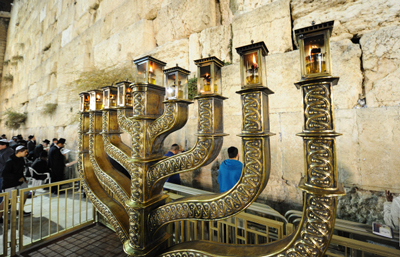December 10, 2020 by Arsen Ostrovsky
Read on for article
On Thursday evening, Jews around the world will begin the eight-day celebration of Hanukkah, one of the most beautiful and meaningful holidays in Judaism.

A Chanukah menorah on the last night of the eight-day Jewish holiday, at the Western Wall in the Old City of Jerusalem, on Dec. 19, 2017. Photo by Mendy Hechtman/Flash90.
Although Chanukah is a uniquely Jewish story, its lessons about the importance of preserving our religious freedom are universal, irrespective of individual faith or background.
The ancient story of Chanukah itself occurred more than 2,000 years ago, around the 2nd century B.C., when the Jews, led by Judah Maccabee, successfully repelled their Greek-Syrian oppressors, led by the tyrant, Antiochus, who ruled the Land of Israel at the time.
Prior to the rebellion, Antiochus sought to forbid the practice of Judaism and ordered the Jews to turn instead to the Greek gods and pagan-worship, the very antithesis of the Jewish faith, which gave birth to monotheism.
In a miraculous victory against all odds, the Jews fought back, defeating Antiochus’s army—restoring their right to worship, and rededicating the Second Temple in their ancient capital, Jerusalem.
But what does this struggle for religious freedom teach us today?
On Dec. 10, the same day that Jewish families will gather to celebrate the first night of Chanukah, we will also mark 72 years since the United Nations’ adoption in 1948 of the Universal Declaration of Human Rights.
The historic document, for the first time, set out a number of fundamental human rights, including Article 18 of the Universal Declaration, which states: “Everyone has the right to freedom of thought, conscience and religion; this right includes freedom to change his religion or belief, and freedom, either alone or in community with others and in public or private, to manifest his religion or belief in teaching, practice, worship and observance.”
However, as we assess the current state of religious freedom around the world, how does it measure up against this noble goal? A brief glimpse would suggest not particularly well, with religious freedom increasingly under relentless assault.
In China, more than one million ethnic Uyghur Muslims have been herded into concentration camps by the Chinese Communist Party, which is seeking to ethnically cleanse this community through a state-sponsored infrastructure of forced sterilizations, abortions, torture, electrocution and even murder.
In Iran, blasphemy, apostasy and proselytizing of Muslims are crimes punishable by death, as is the case in a number of Muslim countries in the Middle East. Minorities, such as the indigenous Baha’is and Christian converts, are still not recognized under the Iranian constitution, and are frequently subjected to violence, torture, discrimination and arbitrary arrest, at the hands of Iranian authorities.
Meanwhile, Turkey continues its Islamization of the country and unabated assault against religious minorities. This year, Turkish President Recep Tayyip Erdoğan ordered at least two ancient churches to be converted into mosques, in his seemingly relentless campaign to erase all traces of Orthodox Christianity in the country.

Arsen Ostrovsky
Across Africa, the Christian community continues to be singled out for persecution and violence, being driven out en masse. Only two weeks ago in the northeast of Nigeria, Islamist terrorists from Boko Haram slaughtered 110 people, as the world stood silent, in cold indifference to their plight.
Even many Jewish communities—first and foremost across Europe, but also in the United States and, of course, in Israel, 2,000 years after the Maccabee revolt for our freedom—are still being singled out and persecuted, for one reason and one reason only: because we are Jews or that we have chosen to live in the Jewish state.
Regrettably, the U.N. Human Rights Council, the very body entrusted as the guardian of the Universal Declaration of Human Rights, can no longer be relied upon to defend the oppressed and hold accountable their oppressors. How could it, having just elected gross human-rights abusers China, Russia, Cuba and Pakistan to the Council, where they will join the likes of Venezuela, Libya and Somalia?
In 2015, Lord Jonathan Sacks, the esteemed former chief rabbi of Britain who passed away last month, observed in the House of Lords, during a discussion on Article 18 of the Universal Declaration of Human Rights—the very article that purportedly enshrines our right to religious freedom and belief—that this freedom “is about our common humanity, and we must fight for it if we are not to lose it.” This, he said, “is the issue of our time.”
Therefore, those who believe in the right to religious freedom as a fundamental human right, irrespective of faith or background, must never remain indifferent when this very right is denied to others.
Like the Chanukah miracle, the light of religious freedom must prevail over intolerance; hope must prevail over despair and good must prevail over evil, for without the right for all to worship freely, no-one is truly free. That is the universal message of Chanukah.
Arsen Ostrovsky is an Israel-based international human rights lawyer. You can follow him on Twitter: @Ostrov_A.
 RSS Feed
RSS Feed















 December 10th, 2020
December 10th, 2020  Awake Goy
Awake Goy  Posted in
Posted in  Tags:
Tags: 













